Shortly after Rob Downey and Paul Sayler opened their Burlington outpost of American Flatbread in 2004, company founder George Schenk came from Waitsfield to speak to the staff. Downey recalled scribbling down everything Schenk said. Then he compiled the wisdom and, following a Flatbread tradition that Schenk had started years earlier, turned it into a “menu dedication.” The one-page tributes and poetic musings are written weekly and tucked into Flatbread menus or displayed on tables.
Downey titled this dedication “The World According to George.” Among its 40 lines:
“Conduct business in a way that is respectful to farmers, staff, purveyors, and customers.”
“We can’t be a great pizzeria when the rest of the community crumbles around us.”
“We believe in shared meals; everybody eating the same thing unifies the experience.”
Over American Flatbread’s four decades, these principles — respect, community support and gathering around wood-fired, locally topped pizzas — have served as the Vermont institution’s spiritual North Star. But, toward the end of the aughts, that bright star began to feel distant to Schenk and his wife, who is also named George but called GG. On top of running the flagship Waitsfield restaurant and bed-and-breakfast, they were juggling the needs of more than a dozen licensed locations, plus production of 4,000 flatbreads weekly for their nationally distributed frozen line.
The couple decided to return to their roots. By 2012, they had sold their restaurant development group, licensed the frozen flatbread and refocused on the core values at the company’s Mad River Valley heart — or “relocalized,” in George’s words.
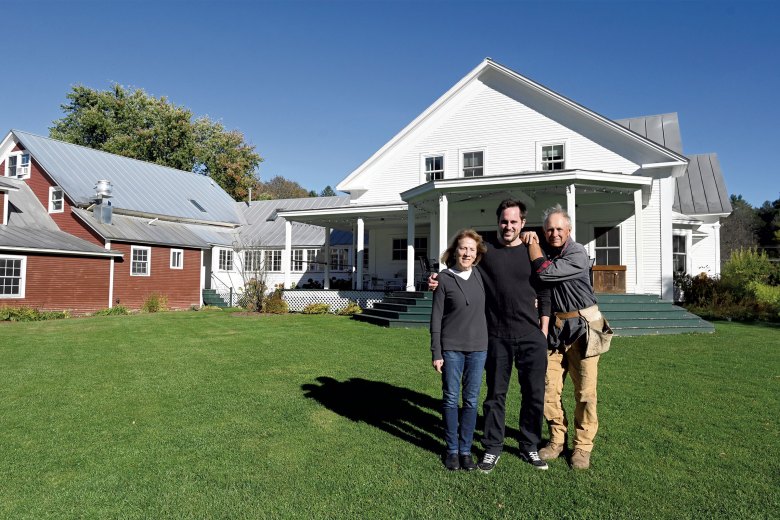 GG, Willis and George Schenk outside the Inn at Lareau Farm and American Flatbread in Waitsfield Credit: Jeb Wallace-Brodeur
GG, Willis and George Schenk outside the Inn at Lareau Farm and American Flatbread in Waitsfield Credit: Jeb Wallace-Brodeur
Now, the Schenks are completing the sale of the business to their 33-year-old son, Willis, who was reared on American Flatbread — corporally and philosophically. He will chart his own course while keeping his parents’ North Star firmly in his sights.
George, 73, was raised on a different kind of pizza in Connecticut: the famed Frank Pepe Pizzeria Napoletana coal-fired pies in New Haven. He arrived in the Mad River Valley as a ski bum in 1979 and soon fell in love with Vermont, cooking and his future wife. She became GG, for “Girl George,” alongside “the more notable George,” she joked.
American Flatbread was born in 1985 in the couple’s Warren yard, where George built a small wood-burning stone oven. The drafty, doorless oven did not suit loaves, so he tried baking thin, flat breads. “Once you have a flat piece of dough in front of you,” he said, “it’s sort of hard not to embellish it with things.”
In 1987, with their 9-month-old daughter, Hanna, strapped to one of their backs, the Schenks started holding weekly flatbread pop-ups using an oven George built at Waitsfield’s Tucker Hill Lodge, where he worked as a cook.
The name “flatbread” stuck, George said, to distinguish his pizza in a crowded landscape and because he thought it sounded more elegant. He appended “American” in a nod to New American cuisine, the era’s culinary movement that celebrated the fresh, local ingredients he used as toppings.
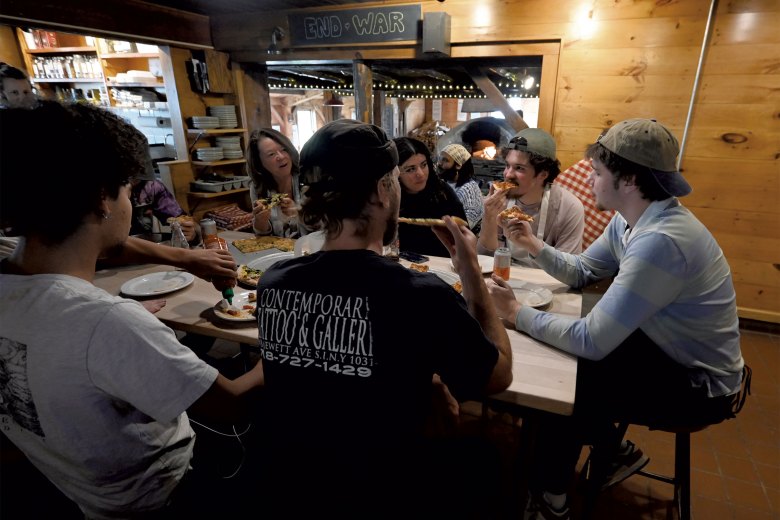 A staff meal at American Flatbread in Waitsfield Credit: Jeb Wallace-Brodeur
A staff meal at American Flatbread in Waitsfield Credit: Jeb Wallace-Brodeur
Since childhood, when George watched his grandmother cook on a wood-fired stove, he’d been entranced by “the beauty and the effect that the fire has on the food,” he said.
George recalled the summer night when he realized that flatbread would be his life’s work. “The full moon was rising in the east, and there was the firelight in my eyes, my daughter on my back and my wife next to me, helping me,” he said. “I had one of those moments of rare perfection in life.”
People flocked to Tucker Hill Lodge for the Schenks’ flatbread, and they added more nights before launching wholesale production of frozen pies in 1990. George knew that the seasonal, mostly weekend Mad River Valley restaurant business would not support their growing family.
In 1992, the Schenks opened their own weekend restaurant in the barn at Waitsfield’s Lareau Farm, where they had previously moved their frozen production. Monday through Thursday, a team churned out flatbreads for retail orders; then, with a flurry of moving folding tables and chairs, the barn became a restaurant on Friday and Saturday. That year, their frozen line got a boost from a distribution partnership with Ben & Jerry’s.
“It was a big step up from driving it around in people’s cars,” said GG, 76.
George also credits the ice cream company with demonstrating how to build a socially responsible business. Flatbread threw its first Benefit Bake for Florida hurricane relief on his 40th birthday, in 1992. Today, George said, the Flatbread restaurants raise several hundred thousand dollars annually through such events — one of many ways they support their communities.
A Flatbread fan who skied in the Mad River Valley launched the first licensed restaurant in 1998 in Amesbury, Mass. George saw expansion as an opportunity to spread good food and build a stronger company.
Around the same time, two young Vermont entrepreneurs tasted their first flatbreads and were wowed. Downey and Sayler are now business partners in Third Place, a hospitality company that operates American Flatbread restaurants in Burlington and Stowe and has provided support and funding for many local food and beverage brands, including Zero Gravity Craft Brewery.
When the duo met with George in the late 1990s about opening a brewpub with an American Flatbread menu, he welcomed their interest warmly but asked what they knew about the restaurant business. Then he invited them to work with his baking team.
“What struck me immediately was how egalitarian and nurturing the environment was,” Sayler recalled. “George is an exemplar of a true businessman but also does it in such an openhearted way.”
“George represented to me everything that was good and right about doing business in Vermont,” Downey said, from deploying commerce for social good to supporting local farms.
The pair partnered with the Schenks to launch a Middlebury Flatbread in 2002. Two years later, they opened their own American Flatbread Burlington Hearth on St. Paul Street under a licensing agreement.
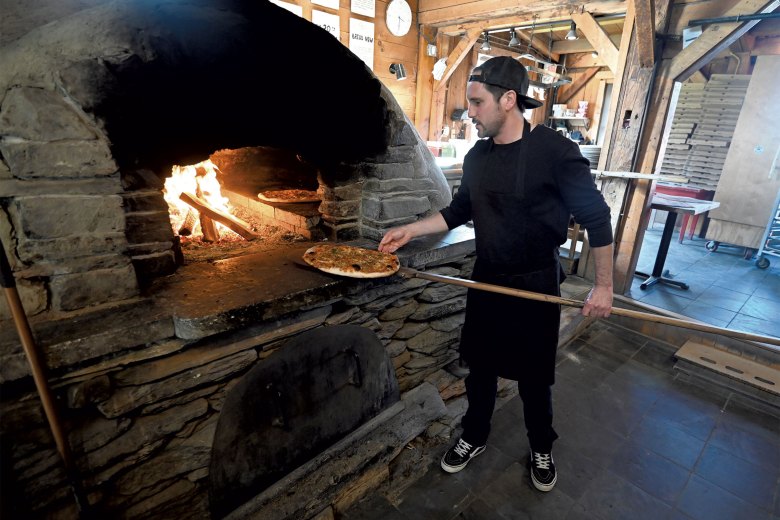 Willis Schenk baking flatbreads in a wood-fired oven Credit: Jeb Wallace-Brodeur
Willis Schenk baking flatbreads in a wood-fired oven Credit: Jeb Wallace-Brodeur
Beyond those direct ties, Flatbread’s “roots and mission have permeated every restaurant we’re involved with,” Downey said. “Without George, I’m not sure Zero Gravity would ever have happened.”
As American Flatbread grew through the first decade of the 21st century, the complex demands of managing licensed restaurant relationships and the frozen flatbread business pulled George away from the hands-on work that fulfilled him.
“He would wake up in the middle of night going, ‘This is not what I want,’” his wife recalled.
“I felt like I was losing my center and my roots,” George said. He realized, “the goal was not to build a company; the goal was to create a life that I could look back on and be happy I lived.”
By 2010, the Schenks had licensed the frozen flatbread business to Rustic Crust in New Hampshire. A couple of years later, they sold their restaurant development group. Today, the American Flatbread family of independently run restaurants numbers 10, under a licensing umbrella managed by the Boston investment firm Churchill James. Frozen pizza has been on hiatus since Rustic Crust declared bankruptcy in 2024, but George is talking with Churchill James about its possible return.
The mothership at Lareau Farm continues to serve up to 1,000 diners on busy weekends. Children kick soccer balls in the back field and peek at the pigs in the market garden while they wait for pizza. Guests in line for tables can explore the 25-acre property or visit community art shows in the restored barn. The glow from the massive earthen oven on a stone base warms the room as its intense heat blisters flatbreads to chewy-crusted perfection.
Classics such as the Medicine Wheel ($20.50), topped with cheeses, housemade tomato sauce and herbs; and the Evolution salad ($12.25), with the house signature ginger-tamari vinaigrette, anchor the simple menu, embellished with a few specials. A recent seasonal meat flatbread ($36) featured pork raised at nearby Gaylord Farm, plus local corn, shishito peppers and roasted tomato salsa.
“It just kept drawing me back.”
Willis Schenk
The Waitsfield pizzeria remains a model and resource for all the Flatbread restaurants. The Schenks receive a percentage of the licensing fees and consult as requested. They will host the annual meeting of Flatbread operators in November and help keep the group’s home fires burning through oven building and repair, now often done by Willis.
Sayler recalled working side by side with Willis on the twin ovens at the Stowe Flatbread, which opened in 2022. Having known Willis since he was small, Sayler was “really taken by how he has grown into his own person,” he said, with an “innate pragmatism and groundedness” as well as “marvelous craftsman mastery of that arcane structure that is the Flatbread oven.”
The soon-to-be-owner’s first job in the family business was not as auspicious, Willis recalled with a grin. At age 14, he was tasked with mowing the lawn. The old rider mower was leaking oil, and he never thought to top it off. “The mower blew up,” he said. “I think we had a mowing service for a while after that.”
Later, through his college summers, Willis rotated through almost every position at the company. He eventually came on board full time after settling for good in Warren in 2017. “It just kept drawing me back,” he said.
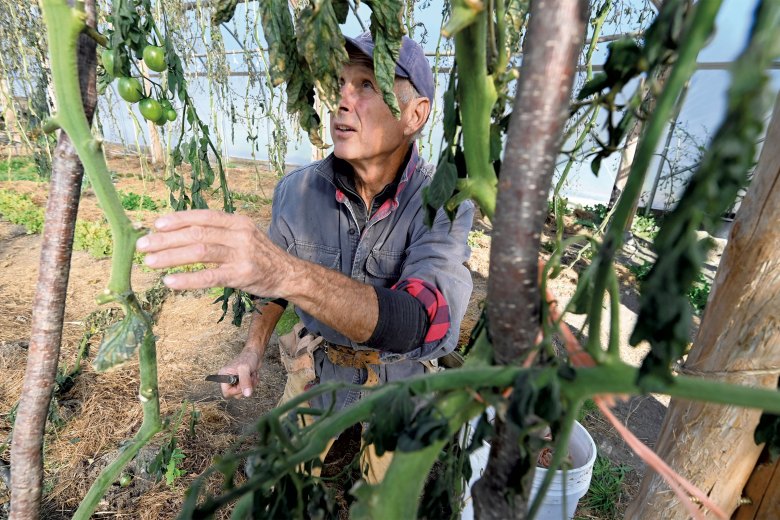 George Schenk working in the Lareau Farm market garden Credit: Jeb Wallace-Brodeur
George Schenk working in the Lareau Farm market garden Credit: Jeb Wallace-Brodeur
His parents didn’t burden their two kids with any expectations of taking over, but they’re clearly thrilled Willis concluded it was the right path for him.
“He’s seen us go through ups and downs, pulling our hair out,” GG said.
George said he hopes that his son’s choice allows for “the kind of happiness and peace that is so good to have in a life [and] that Flatbread and the work here is a joy, not a burden.”
For the dozen years since he unburdened himself of far-off responsibilities, George has spent much of his time working in the Lareau Farm market garden. Besides the pigs, it hosts a laying flock and turkeys and produces most of the salad greens and tomatoes for the restaurant, along with many other ingredients for the menus and the property’s busy wedding and event catering schedule.
When he wakes each morning, George said, he thinks, What would be good and worthwhile to do?
George also continues to compose menu dedications. In honor of the recent harvest moon, he penned an ode to the moon and a plea for “more better, cleaner food — food that fills our hunger, that tastes good and is a joy to eat, food that nourishes and nurtures, and helps heal our afflictions.”
He signed it, as he almost always does, “Thanks for coming tonight. Love, George.”
American Flatbread, 46 Lareau Rd., Waitsfield, 496-8856
The original print version of this article was headlined “Pizza With a Purpose | As Waitsfield’s American Flatbread turns 40, a new generation takes the lead”


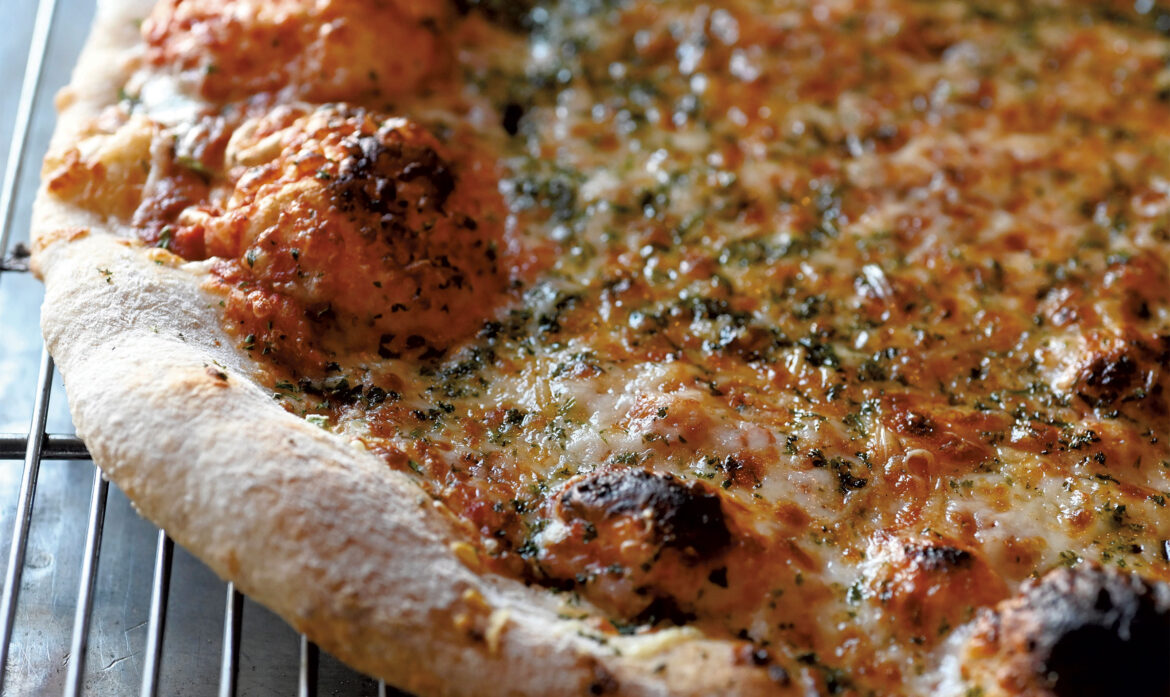
Dining and Cooking